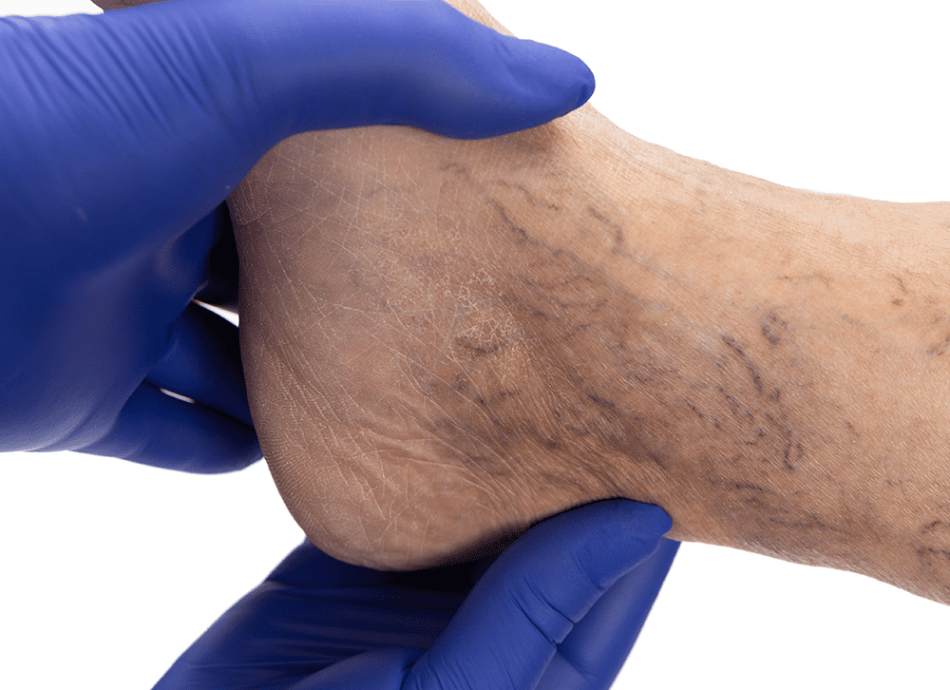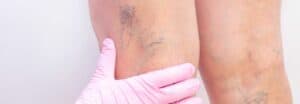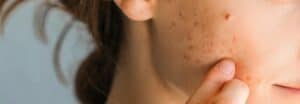Conditions We Treat With A VAscular LAser
Vascular laser treatment in kent
Vascular lasers are used to target and remove unwanted or abnormal blood vessels in the skin. The laser is targeted, meaning it focuses on the areas which require treatment, while leaving the surrounding healthy skin untouched. Here at the Canterbury Skin and Laser Clinic, we use the Pulsed Dye Vascular laser to treat the following common skin conditions:
- Facial and leg telangiectasias
- Rosacea
- Spider and cherry angiomas
- Acne scars
- Traumatic scars
- Surgical scars
- Portwine stains
- Haemangiomas
- Angiokeratomas
- Hereditary haemorrhagic telangiectasia
What is a Pulsed Dye Laser or Vascular Laser?
The Pulsed dye laser treatment is designed to lighten red coloured skin marks, such as port wine stains, birth marks on your skin or facial thread veins. These marks are referred to as ‘lesions’ throughout this leaflet. These lesions contain tiny blood vessels (capillaries) which have grown larger or more clustered; this is the site of laser treatment.
TREATING SKIN CONDITIONS WITH A VASCULAR LASER
During you consultation at the Canterbury Skin and Laser Clinic, your consultant dermatologist will assess your skin condition and recommend the most appropriate treatment option for you. In some cases, this may be a vascular laser.
Vascular lasers work to treat a range of skin conditions by exposing the lesion to short pulses of light. They emit a very strong light of a single wavelength that is carefully matched to the absorption characteristic of the target tissue. The light is absorbed by the target and converted into heat thereby destroying the target. Because this destructive process is over in a tiny fraction of a second, there is little time for the heat to affect other tissue nearby, and because of this the risk of scarring is minimised. The temperature from the light is just enough to damage the vessel of the lesion, which is then absorbed back into the body, making them less visible.
Multiple treatments are often required to achieve the best results from a vascular laser depending on your skin type and the severity and location of your condition which requires treatment. Following treatment you may experience some redness, bruising or swelling but this will settle down over a couple of days.
FREQUENTLY ASKED QUESTIONS
IS ANYONE SUITABLE FOR PULSED DYE LASER TREATMENT?
In some cases, treatment using a vascular laser may not be suitable for you. These will be fully discussed during your consultation where alternative treatments may be offered. These include:
- If you are pregnant or breastfeeding
- Have an active infection at the area which requires treatment
- Are taking certain medications that cases sensitivity to light
WHAT ARE THE POTENTIAL SIDE EFFECTS OF VASCULAR LASER TREATMENTS?
Following treatment you may experience some redness, bruising or swelling. In very rare cases there may be some blistering or temporary changes in colour to the skin. These risks are minimised by using cooling devices and having a very experienced therapist carrying out the treatment. It is also important to not expose the skin to strong sunlight following treatment.
ARE VASCULAR LASERS SAFE?
If used by experienced and well trained staff then vascular lasers are safe to use and they are not associated with an increased risk of skin cancer. At the Harley Street Dermatology Clinic, all our staff are fully trained with a wealth of experience and treatment is carried out in care quality commission approved facilities.
WHAT ARE THE SIDE EFFECTS OF VASCULAR LASER TREATMENT?
As with any procedure, pulsed dye laser treatment carries some degree of risk. Whilst serious complications are rare, it is important to be aware of any potential risks and to discuss any concerns with your doctor at the time of treatment.
- Bruising – The area of treated skin will look bruised initially, but this should fade in 1-2 weeks.
- Swelling– treatments round the eyes, especially when non bruising mode is applied can result in some puffiness or swelling. This usually resolves in 48 hours.
- Alteration in skin colour– There is a minimal risk of changes to the skin’s colour with use of a pulsed dye laser. The laser can cause hyperpigmentation (darkening of the skin) which usually fades or hypopigmentation (lightening of the skin) which can very rarely be permanent. This is uncommon; however hypopigmentation is more likely to occur if you have black or brown skin or if the treatment area is suntanned. Most doctors will therefore avoid using a pulsed dye laser on a suntanned area of skin.
- Increased sensitivity to light – Skin that has been treated with a pulse dye laser is more susceptible to sunlight and at a greater risk of sunburn for up to a year after treatment. If there is any risk of exposure, you must apply a sunscreen which protects from UVA and UVB rays at factor 15 or higher.
- Eye damage – The laser beam will damage eyes if you look directly at it without protection. You will be supplied with special goggles to protect your eyes from the light.
- Scarring –A scab may form over the treated area. Try to avoid picking at the scab as it may leave a scar or increase your risk of infection.
- Infection – There is a slight risk of infection, but this is very rare. Infection is most likely to happen if scabs form in the treated areas.
REQUEST A CALL BACK
Please fill in this form and one of our team will give you a call back to arrange a consultation with one of our expert dermatologists.

HEAR FROM OUR PATIENTS
WHY choose vascular laser treatment AT CANTERBURY SKIN AND LASER CLINIC?
Here at Kent’s leading private skin and laser clinic, our experts are specialists in all aspects of dermatology, skin cancer, anti-ageing and beauty treatments. We are one of the few skin clinics in the UK where all medical consultations and treatments are provided by specialist doctors with Dermatology experience and laser training.
Canterbury Skin and Laser Clinic is regulated by the Care Quality Commission, ensuring the best level of treatment is provided to you in a safe environment. Our Clinical Lead Dr Mark Hudson-Peacock is a member of the British Association of Dermatologists, the British Laser Medical Association, the British Hair and Nail Society, the European Academy of Dermatology and Venereology and is certified by the Consulting Room. We have won many awards including the WhatClinic Patient Service Award in 2019 and the ghp Healthcare and Pharmaceutical Awards 2019.
latest INSIGHTS AND ADVICE

Safeguard Your Skin – The Comprehensive SPF Guide
Discovering the Power of Sunscreen The SPF label on skincare products might leave you puzzled, especially if you’re a skincare beginner. But worry not, we’ve got you covered. In this comprehensive guide, we’ll explore why SPF is essential for skincare, how to pick the right

Varicose Veins: Recognising, Managing and Preventing
Varicose veins, with their knotted, engorged appearance, can steal the allure of your legs and cause discomfort. Such veins are common, especially as we age. Unlocking the complexities of varicose veins is essential in managing and reducing their complications. This exhaustive guide unravels the mysteries

Understanding Acne: A Deep Dive For Acne Awareness Month
Acne Awareness Month is marked globally in June. It’s an opportunity to shed light on one of the world’s most common skin conditions, emphasising the importance of education, support and accessible treatments for those living with acne. Acne Awareness Month seeks to debunk misconceptions, share




